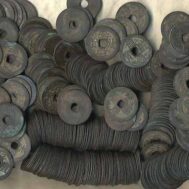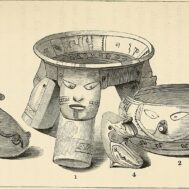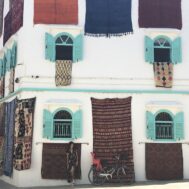In August 2024, Robert “Bob” Gallegos received the ATADA Lifetime Achievement Award, the highest accolade for a member of ATADA, the Authentic Tribal Art Dealers Association. Gallegos helped to found ATADA in the 1990s, as the Antique Tribal Art Dealers Association (ATADA now also includes dealers in postwar and contemporary ethnographic art). ATADA is an international association of dealers, auction houses, museums and collectors. It is focused on ensuring that its members meet the highest standards of ethics, integrity and responsible collecting practices.
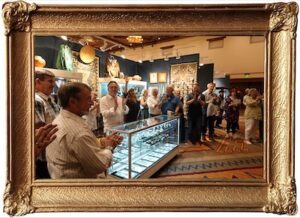
ATADA Award ceremony at 2024 Whitehawk SHow. Will Hughes, President and members of ATADA.
Gallegos has seen every facet of the tribal art trade since Native American art achieved widespread global recognition in the 1970s. Native American art has long been the most popular form of art collected in the United States, with important collections starting with that of Thomas Jefferson and expanding continuously since the second half of the 19th century.
Gallegos became a collector as a teenager in northern New Mexico. His college degree in business and finance only briefly took him into a banking career. After just a few years, his passion for Native American art drew him into a lifetime in the art trade, first as a trader in contemporary pottery from Southwestern pueblos in the 1970s. In the 80’s, Gallegos’ connections with Native carvers and potters enabled him to establish a flourishing local Albuquerque auction house. He built an appraisal business serving museums, collectors, shippers and the IRS, drawing on his intimate knowledge of the whole range of antique and contemporary Indian art. He was also fascinated – and concerned – by the prevalence of fakes by non-Natives being substituted for authentic works. By the 1990s, he had co-curated an early show on Native American fakes at the Maxwell Museum in Albuquerque and completed an important book on historic and contemporary pottery with Francis Harlow. Gallegos has also contributed to other books on historic Native American jewelry, in which he specialized.
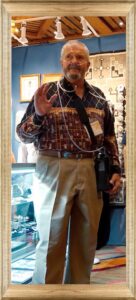
Robert Gallegos at the award ceremony in Santa Fe.
As a founder of ATADA, Gallegos served as its President for several years in the 1990’s and as Treasurer from 1990 to 2012. He has been active in representing art trade interests both locally and nationally. Gallegos testified before Congress in hearings in support of the 1990 Native American Graves Protection and Repatriation Act (NAGPRA). Thirty years later he testified again before Congress, this time challenging the unworkable and imbalanced provisions of the 2021 Safeguard Tribal Objects of Patrimony Act (the STOP Act). Mostly, however, Bob has worked quietly behind the scenes, for example in limiting the intrusion of government into private collecting in NAGPRA, or in obtaining agreement from tribes on a compromise bill to the STOP Act (unfortunately later abandoned by them). In the case of the STOP Act, excessively burdensome legislation may be a factor in the Department of Interior’s failure to define export procedures almost two years after passage. Instead, Bob has worked to build consensus and better understanding, seeking pragmatic, workable solutions instead of engaging in adversarial grandstanding, an approach that has earned him the respect of tribes and art dealers alike.
Gallegos has continuously served as a member of ATADA’s board, and in recent years has led the ATADA Foundation, a separate 501(c)3 nonprofit. The Foundation provides grants to arts and arts policy organizations, museums, institutions, and federally recognized tribes. It promotes programs that advance knowledge of the cultural, historical, and aesthetic importance of the tribal arts of North America and the world, and the peoples that create it. The Vecinos Project, recently created by the ATADA Foundation, specifically invites tribes and tribal organizations to submit proposals for activities and programs that support both the cultural arts and the well-being of Indigenous peoples in the United States. 2023 Foundation grant recipients included the Casa Martina Restoration Project in Chimayó, New Mexico, a scholarship fund for Indigenous students at the Institute of American Indian Arts Foundation, and artist programs at the Indian Pueblo Cultural Center in Albuquerque, New Mexico.
Lectures and Symposia
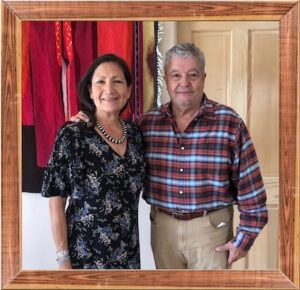
Debra Haaland (currently US Sec’y of Interior) and Robert Gallegos, in an undated photograph.
Gallegos has long understood that building an ethical trade and working to establish positive public policy went hand in hand. Always focused on promoting legitimate trade practices, Gallegos organized a 1993 seminar entitled “Collecting and the Law” in Santa Fe, bringing in as moderator Kevin Gover (Pawnee Nation), an attorney who later served as Assistant Secretary of the Interior from 1997-2001 and director of the National Museum of the American Indian from 2007-2021. While NAGPRA applies to museums and other federally funded institutions, private collecting, even of sacred artifacts, is legal and not subject to NAGPRA provisions on return. Many sacred artifacts were originally released onto the market decades ago after tribes adopted Christianity and turned away from their ancestral religion. A reawakening of traditional spirituality and strong sense of Native identity has taken place in recent decades and encouraged claims for returns of long lost sacred objects.
A frequent speaker himself, Gallegos subsequently organized numerous educational programs, culminating in a major Santa Fe symposium in 2017, “Understanding Cultural Property: A Path to Healing Through Communication.” This symposium, which overflowed the capacity of Santa Fe’s largest hotel ballroom, featured not only lawyers, educators, and auction house representatives, but also traditional spiritual leaders and Cultural Preservation Officers from a number of Southwestern Native Nations.
ATADA’s Voluntary Returns Program
Gallegos used the symposium venue to announce a signature program he had built for ATADA, the ATADA Voluntary Returns Program. In 2016 Gallegos had responded to a challenge from a Native American attorney to build positive relationships between art dealers and collectors and Native American tribes. A legal trade in Indian artifacts has been countenanced and even encouraged by the U.S. government since the 1880s, leaving millions of objects, including a small number of sacred objects, in private hands.
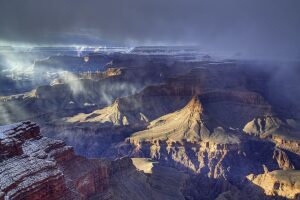
Hopi Point, Grand Canyon (South Rim), Arizona, USA, photo by Alan D. Wilson, 26 January 2017, CCA-SA 3.0 Unported license.
Gallegos identified the greatest challenge as the reconciliation of seemingly disparate concerns held by Native American communities, museums, collectors, and the art market. He sought to establish a collaborative approach that would establish that there were “inalienable tribal objects” whose trade was inappropriate, even if they were legal to own and sell. Gallegos wanted to find a means of bringing key sacred objects back to tribes without damaging a market that not only supports the trade, but which is a primary source of income to Native American artisans, especially in the Southwest.
ATADA responded with multiple complementary actions, modifying its bylaws to prohibit members from selling sacred items that have current ceremonial use and adopting due diligence guidelines prohibiting sales of items removed unlawfully from tribal communities.
Gallegos also urged the ATADA Board to set up the first and only Voluntary Returns Program for Native American sacred objects in the U.S. – which the ATADA Board unanimously approved in 2016. Gallegos and other Board members began to gather ceremonial items from willing donors, long-term collectors and art dealers, who felt that these objects – which are living entities for the tribes – should be in tribal hands.
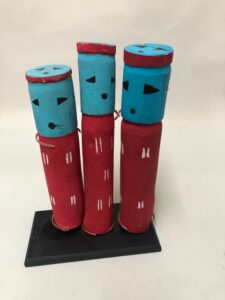
Jemez Pueblo cylinder dolls returned by ATADA Voluntary Returns Program.
At the 2017 symposium, Gallegos explained how the Voluntary Returns Program, in its first year, had brought back dozens of truly sacred objects needed by tribal communities for religious and spiritual activities.
Through the symposium and his continuing educational work, Gallegos has made the ATADA Voluntary Returns Program a phenomenal success – both in consciousness-raising within the collector community and in locating and bringing over 500 important sacred objects to tribal communities in New Mexico and Arizona in just the last six years.
Returned items include several Zuni war gods, an Apache Crown (Gan) Headdress used in the Apache Crown dance ceremony, Acoma and Laguna flat and cylinder dolls, Hopi ‘friends,’ Navajo Yei masks, numerous prayer sticks, bandoliers, rattles, arrowheads and other jish that are part of a medicine bundle. Gallegos has personally followed through on every step of the program, from sharing information on objects located across the U.S. with tribal leaders, to working to identify the proper tribal affiliation. This can be very challenging, as many objects left communities 50 or 100 years ago, and their significance has sometimes been lost. Gallegos routinely drives five hours or more each way to deliver the collected objects and put them directly in the hands of spiritual leaders, who decide their appropriate usage or burial. Most recently, Gallegos located an important altar that had been missing from a tribe for more than 60 years. Gallegos’ mission today is to encourage the continuation of this signature effort, both to return key sacred objects and to build collaboration and goodwill between the art trade and the Native American community.
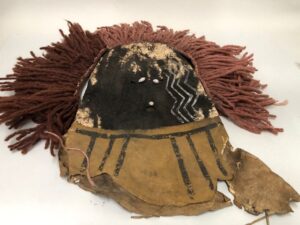
Navajo Monster Slayer mask returned by the ATADA Voluntary Returns Program.
The venue chosen for the presentation of the ATADA Lifetime Achievement Award was the annual Whitehawk Antique Indian & Ethnographic Art Show in Santa Fe. This August marked the largest Whitehawk show ever, bringing together 131 national and international dealers in tribal art from around the world. The award was presented by ATADA President Will Hughes. As Hughes described the many contributions that Robert Gallegos had made to education, public policy, and the betterment of the art community, Gallegos responded with his usual gentle humor, saying that if he’d known how much he’d have to do, he’d never have started in the first place.
Congratulations to Robert Gallegos!
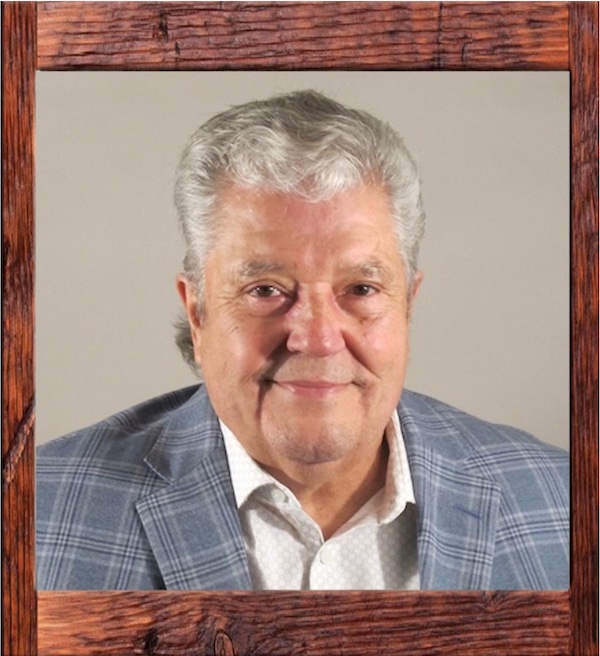 Robert V. Gallegos, recipient of ATADA Lifetime Achievement Award and Founder of the ATADA Voluntary Returns Program.
Robert V. Gallegos, recipient of ATADA Lifetime Achievement Award and Founder of the ATADA Voluntary Returns Program. 